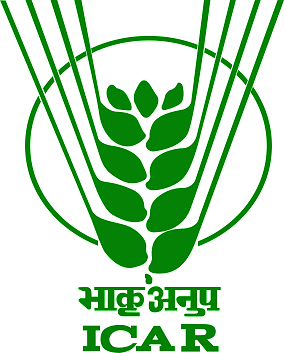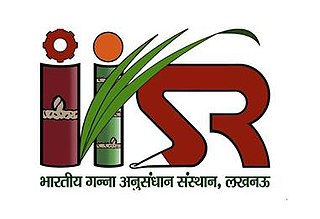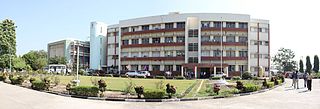
Telangana is a landlocked state in India situated on the south-central stretch of the Indian peninsula on the high Deccan Plateau. It is the eleventh-largest state and the twelfth-most populated state in India as per 2011 census. On 2 June 2014, the area was separated from the northwestern part of Andhra Pradesh as the newly formed state of Telangana, with Hyderabad as its capital.

The Indian Council of Agricultural Research (ICAR) is an autonomous body responsible for co-ordinating agricultural education and research in India. It reports to the Department of Agricultural Research and Education, Ministry of Agriculture. The Union Minister of Agriculture serves as its president. It is the largest network of agricultural research and education institutes in the world.
Ankapur is a village in Armoor mandal, Nizamabad district of the Indian state of Telangana. It comes under the Armur town which is like five kilometers away from this village. This village is considered one of the Model Villages in the country. It is recognized as a Model Village by the ICAR, ICRISAT and the International Rice Research Institute.

Agropedia was an online knowledge repository for information related to agriculture in India. It included universal meta models and localized content for a variety of users with appropriate interfaces built in collaborative mode in multiple languages. This national portal, designed as an "agricultural Wikipedia" hosts wide range of agricultural information on a variety of crops, with an aim to empower farmers with crop information.

Pusa Basmati 1121 is an independently derived Basmati rice variety, evolved through the process of hybridization over a long breeding process. This variety of basmati rice was developed by Padma Shri awardee Dr Vijaipal Singh at Indian Agricultural Research Institute (IARI), New Delhi. It was released for commercial cultivation in Kharif season of 2003 as Pusa 1121. By 2007, the variety has become widely popular with farmers, and was renamed as Pusa Basmati 1121 in 2008. It holds the world record for highest kernel elongation on cooking.
National Innovations in Climate Resilient Agriculture (NICRA) was launched during February 2011 by the Indian Council of Agricultural Research (ICAR) with the funding from the Ministry of Agriculture, Government of India. The mega project has three major objectives of strategic research, technology demonstrations and capacity building. Assessment of the impact of climate change simultaneous with formulation of adaptive strategies is the prime approach under strategic research across all sectors of agriculture, dairying and fisheries.
P. Ananda Kumar is an Indian plant molecular biologist and biotechnologist.
Improved Samba Mahsuri is a high yielding fine grain rice variety. In a collaborative project, scientists from CSIR-CCMB and the ICAR-Indian Institute of Rice Research, worked together to develop it. The variety was developed using Marker assisted selection and has three major bacterial blight resistance genes Xa21, xa13 and xa5. All India Coordinated Rice Improved Project (AICRIP) conducted trails in multiple locations across India, and found positive results for resistance to bacterial blight.

The Indian Institute of Spices Research (IISR) is an autonomous organization engaged in agricultural research related to spices in India. The institute has its headquarters in Moozhikkal, Silver Hills, Kozhikode, Kerala and is a subsidiary of Indian Council of Agricultural Research (ICAR), New Delhi, under the Ministry of Agriculture, India.

The Indian Institute of Horticultural Research (IIHR) is an autonomous organization acting as a nodal agency for basic, strategic, anticipatory and applied research on various aspects of horticulture such as fruits, vegetable, ornamental, medicinal and aromatic plants and mushrooms in India. The institute has its headquarters in Bengaluru, Karnataka, India and is a subsidiary of Indian Council of Agricultural Research (ICAR), New Delhi, under the Ministry of Agriculture, India. It recently has been ranked 1st for the combined years 2019-20 and 2020-21 by the ICAR.
The Central Soil Salinity Research Institute is an autonomous institute of higher learning, established under the umbrella of Indian Council of Agricultural Research (ICAR) by the Ministry of Agriculture, Government of India for advanced research in the field of soil sciences. The institute is located on Kachawa Road in Karnal, in the state of Haryana, 125 km (78 mi) from the Indian capital of New Delhi.

The Indian Institute of Sugarcane Research is an autonomous institute of higher learning, under the umbrella of Indian Council of Agricultural Research (ICAR) by the Ministry of Agriculture, Government of India for advanced research in sugar cane agriculture. The Institute is located on Raibareli Road, Dilkusha in Lucknow, Uttar Pradesh, India. While, The Central Sugarcane Research Institute established in 1912 is located in Coimbatore, Tamil Nadu, India. It works also under the Indian Council of Agricultural Research.
Ebrahimali Abubacker Siddiq is an Indian agricultural scientist, whose research in genetics and plant breeding is reported to have assisted in the development of various high-yielding rice varieties such as dwarf basmati and hybrid rice. The government of India honoured Siddiq in 2011 with the fourth-highest civilian award of Padma Shri.

Telangana is one of the fastest-growing states in India posing average annual growth rate of 13.90% over the last five years. Telangana's nominal gross state domestic product for the year 2020-21 stands at ₹13.59 lakh crore. Service sector is the largest contributor to the Telangana's economy with a share of about 65% in the year 2018-19. Growth in services has largely been fuelled by IT services with the State holding leading position in IT & ITeS in the country in terms of production and exports.
Vanaraja is a dual-purpose chicken variety developed by the ICAR-Directorate of Poultry Research in Hyderabad, India. Vanaraja is aimed a rural communities where it can be reared in backyard on natural, scavenged food with minimal supplementation. It produces eggs and meat based on rearing and feeding practices. Important features of this breed are multi-color feather pattern, immunity to disease, perform with less nutrition, grow faster and produce more eggs, produce brown eggs like local hens.

ICAR - Directorate of Groundnut Research (ICAR-DGR) formerly known as National Research Centre for Groundnut is a premier national level institute set up by the Indian Council of Agricultural Research, Ministry of Agriculture of India to cater to the needs of agricultural science research in the field of groundnut (peanut) crop in India. ICAR-DGR was established in 1979, Gujarat to give a fillip to research for enhancing productivity of groundnut in keeping with its importance among the oilseed crops of India. The research centre came into being as the first crop commodity research unit under the category of NRC's of the Indian Council of Agricultural Research, as an autonomous body set up as a registered society. The National Research Centre on Groundnut (NRCG) was elevated to the level of a Directorate in the year 2009 and rechristened as the Directorate of Groundnut Research.
The Indian Institute of Millets Research (ICAR-IIMR) located at Rajendranagar is an agricultural research institute engaged in basic and strategic research on sorghum and other millets. IIMR operates under the aegis of Indian Council of Agricultural Research (ICAR). It conducts agricultural research on Millets breeding, improvement, pathology and value addition. IIMR coordinates and facilitates sorghum research at national level through the All India Coordinated Research Projects on Sorghum and provides linkages with various national and international agencies.
The Indian Institute of Soybean Research, Indore (ICAR-IISR) is an agricultural research institution located in Indore that focuses on basic and strategic research on soybeans.








